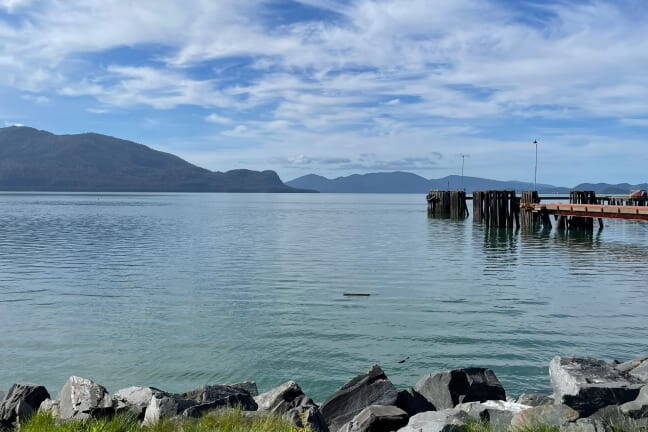The conservation group the Wilderness Society has changed its position and now supports a bill that would create five new Alaska Native corporations in Southeast Alaska. It historically opposed the creation of the new corporations.
Senate Bill 1889 and House Bill 4748, the Unrecognized Southeast Alaska Native Communities Recognition and Compensation Act, would create for-profit Native corporations for five Native communities left out of the Alaska Native Claims Settlement Act of 1971. The settlement act transferred almost a billion dollars and title to 44 million acres to Native corporations to make profits and issue dividends to Native shareholders.
“This is a long overdue shift in The Wilderness Society’s position and is a significant step toward correcting injustices against Alaska Native communities in Haines, Ketchikan, Petersburg, Tenakee Springs and Wrangell,” said Karlin Itchoak, the Wilderness Society’s senior regional director for Alaska, in a prepared statement.
“The fight to amend this act and reunite these communities with their ancestral lands is not just about rectifying a historical wrong, but also about ensuring these communities’ cultural survival and prosperity,” said Meda DeWitt in the statement. She is Naanya.aayí Tlingit from Wrangell, Alaska, and the society’s senior specialist for Alaska.
“Losing access to our lands means losing a piece of ourselves. Our ancestors have lived off this land for generations, respecting the inherent sentience and intimately understanding its rhythms. By supporting this cause, we are not just advocating for land rights; we are standing in solidarity for the preservation of the Indigenous culture, traditions, and ways of life,” DeWitt said.
U.S. Sen. Lisa Murkowski, R-Alaska, who sponsored the bill, emailed, “I am pleased to see that The Wilderness Society has finally reversed their opposition to my legislation that would rectify the omission of five Native communities being excluded from ANCSA, and seeks to make reparations for the financial and cultural harm of this injustice.”
“Further, I want to commend them for their apology to these communities for the harm their past opposition has caused. I hope all stakeholders involved will realize that these Tribes have been stewards of these lands since time immemorial, and there is no greater advocate for their conservation and protection. Finally resolving this long standing injustice should be an imperative for all,” she said.
Richard Tashee Rinehart Jr., Tlingit, is advocating for the bill on behalf of the five communities. He applauds the society’s new position. The society has more than a million members and supporters, according to its website.
“We’re very thrilled… . it makes a difference when a group that large is supportive,” Rinehart said.
He said the Southeast Alaska Conservation Council last year came out in support of the bill, and the Sierra Club and EarthJustice, two large national environmental organizations, have changed their opposition to a neutral stance.
Rinehart said the landless bill has long been viewed as a timber issue.
“Environmental conservation groups have opposed us fearing that we would log and clear cut in the Tongass National Forest, but they’re now seeing it more properly as a social justice issue and righting an inequity that goes back to the very days of when Alaska became a territory of the United States,” Rinehart said. “…I believe that’s proper because the way we see it is that our land was taken, our land was stolen, and to do nothing about it is to say that you’re okay with realizing that land was taken and you’re just happy to sit back and do nothing about it.”
The reasons for the communities being left out of the 1971 settlement act are not known, as Sage Smiley of KSTK in Wrangell reported on Aug. 4, 2023. “A report by University of Alaska’s Institute of Social and Economic Research in the mid-1990s found no clear reason why the communities were excluded, other than Congressional intent,” Smiley said in her news story.
She continued, “at a Congressional hearing in 2015, [the late Rep. Don] Young speculated it was because of the thriving logging in and around the five communities at the time of the law’s passage in the early 1970s. At the time, Young said timber groups lobbied hard against the communities’ inclusion, fearing it would impact future logging claims.”
The society said in its statement “we apologize to our Native partners for the hurt our past opposition to this bill has caused; we continue to do the necessary work of centering our Native partners and reflecting on how we can better support them; and we trust in the communities of Haines, Ketchikan, Petersburg, Tenakee Springs and Wrangell to continue to steward this land as they have since time immemorial through their newly formed corporations.”
The society is also asking that the corporations be funded so as to “avoid forcing them to rely on extractive industries to fund their startup costs.”
The society went on to say some of the Native communities affected by this issue have continued to partner with the society, “including in defense of Roadless Rule protections in the Tongass.”
The bill has been referred to the Senate Committee on Energy and Natural Resources and the House Natural Resources Committee.
• Joaqlin Estus, Tlingit, is a national correspondent for ICT. Based in Anchorage, she is a longtime journalist. This article was originally published by ICT, an independent, nonprofit, multimedia news enterprise. ICT covers Indigenous peoples. Alaska Beacon, an affiliate of States Newsroom, is an independent, nonpartisan news organization focused on connecting Alaskans to their state government.

